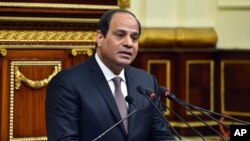Egypt's president said Wednesday that unfair criticism of the government is contributing to attempts to bring down the state, telling Egyptians not to listen to anyone but him.
President Abdel-Fattah el-Sissi did not go into specifics in an address broadcast live, saying only that he would "remove from the face of the Earth" anyone plotting to bring down the state.
El-Sissi's government has faced a wave of criticism in recent weeks over alleged police brutality and other rights abuses, as well as its handling of the economy. The recently elected parliament, a 596-seat chamber, has been widely dismissed by critics as a rubber-stamp legislature.
El-Sissi said he knows the "remedy" for Egypt's problems.
"Please, don't listen to anyone but me. I am dead serious," he said in a loud, angry voice. "Be careful, no one should abuse my patience and good manners to bring down the state."
"I swear by God that anyone who comes near it, I will remove him from the face of the Earth. I am telling you this as the whole of Egypt is listening. What do you think you're doing? Who are you?''
As military chief, el-Sissi led the July 2013 overthrow of Egypt's first freely elected president, an Islamist whose divisive rule ignited mass protests. El-Sissi was elected president a year later, winning the vote with a landslide.
But critics say he has done little to distinguish his rule from that of the Islamist Mohammed Morsi, particularly regarding freedom of expression. One of Egypt's most prominent columnists, Ibrahim Eissa, on Sunday accused el-Sissi of presiding over a "theocracy" after an author was jailed for two years over the publication of a sexually explicit passage from one of his novels.
Rights groups have meanwhile compared his rule to that of former President Hosni Mubarak, who was toppled by a 2011 popular uprising driven in large part by anger at police brutality. The government has jailed thousands of Islamists since 2013 along with scores of secular activists, including leaders of the 2011 uprising. Rights activists have documented the return of arbitrary arrests, torture and disappearances.
El-Sissi said it is "still very early for open democratic practices, like criticizing and pushing [officials] out of office."
"I am not saying that there is no democracy. By God, no I am not, but be careful. We are practicing it under difficult circumstances, so let us safeguard Egypt,'' he said.
El-Sissi devoted much of his 120-minute speech, by far his longest since coming to office in June 2014, to the threats Egypt faces and his efforts to spare it from the violence convulsing much of the region.
"What has been achieved in the last year and half was not achieved in 20 years before then,'' he said, referring to a series of infrastructure projects, including an expansion of the Suez Canal.
He also suggested for the first time that militants were behind the downing of a Russian passenger plane that crashed in Sinai on Oct. 31, killing all 224 people on board. The crash dealt a major blow to Egypt's vital tourism sector and raised troubling questions about the state of its airports' security.
The extremist Islamic State group claimed responsibility for the crash, and Russia announced in November that a bomb brought down the aircraft shortly after takeoff from a popular Red Sea resort. Egyptian officials, however, have maintained that they must wait for the findings of an international probe before they can say what caused the crash.
"Those who downed the aircraft, what did they hope to achieve? Just to hit tourism?'' el-Sissi said. "No, they also wanted to strike at our relations with Russia ... and, if they could, with the whole world, so we are left alone and isolated.''
Egypt has been battling an IS-led insurgency in the Sinai that grew increasingly assertive after Morsi's overthrow, and which has carried out attacks across the country. On Wednesday, el-Sissi acknowledged -- also for the first time -- that security forces had committed "excesses'' in Sinai, saying it was difficult to combat terror while safeguarding people's rights.
"Am I happy about it? No,'' he said.




